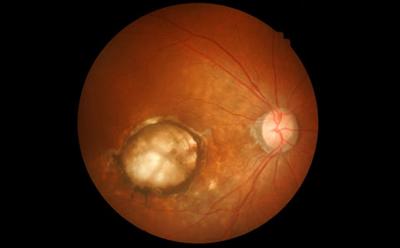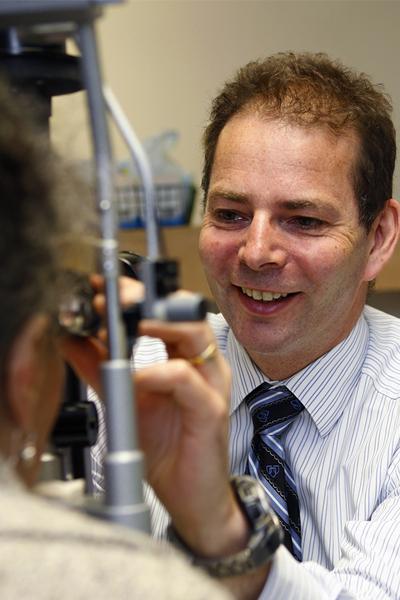Eye expert leads research to better predict blindness in patients

A University of Southampton eye expert is leading research using state-of-the art imaging to predict which patients with early age-related-macular-degeneration (AMD) are at more risk of blindness.
Professor of Ophthalmology in the University’s Faculty of Medicine and Institute for Life Sciences member, Andrew Lotery, is leading an international research team which has received nearly £4m funding from the Wellcome Trust to explore what makes early AMD progress towards visual loss. The innovative study brings together experts in ophthalmology, genetics, statistics and computer science to collaborate on the project.
AMD is a very common cause of blindness with 200 million people expected to be affected by 2020, increasing to nearly 300 million by 2040. It is a complex, inherited, and diverse disease that affects the macula - the central retina that is responsible for detailed central vision.
Doctors currently don’t know who will develop the sight-threatening stage of the disease; some patients progress slowly, or not at all, while others quickly deteriorate.
The five-year research project will teach computers to analyse high resolution images of the inside of the eye to identify what eye changes appear in patients with AMD and identify the structural changes that lead to and are associated with cell degeneration in the retina in patients with early AMD.
Andrew, who is also a consultant ophthalmologist at Southampton General Hospital’s eye unit, says: “Our research aims to pinpoint what makes AMD progress towards visual loss, and enable us to better predict which patients will progress to the late stages of the disease. By understanding more about these markers and why AMD develops, we will be able to better inform patients, clinicians and researchers on prevention, screening, and individualised treatment strategies.
“Ultimately it will help us make sure patients are in the right place - with some in the community and those who need specialised treatment in hospital – and will also help us manage capacity better. We will be able to run clinical trials more effectively and thus allow faster development of new treatments. We expect the research to give us new insights into how the disease develops and new treatments will result from this.”
The project involves studying over 60,000 retinal images of patients who have already had their eyes scanned as part of the UK biobank. Results from this analysis will be validated in 400 patients with early AMD who will have their eyes scanned every four months to detect the earliest focal sites of disease progression. They will undergo state-of-the-art imaging of the major tissues; neurosensory retina, retinal pigment epithelium and choriocapillaris to identify the sequence of cell degeneration.
The study is being carried out in collaboration with established tertiary referral centres for patients with retinal disease at the University Hospital Southampton NHS Foundation Trust, Moorfields Eye Hospital (MEH), Medical University of Vienna and University Hospital Basel. It also involves computer science and statistic experts at Imperial College, London and genetics experts at the University of Michigan.
Principal Investigator Professor Lotery is renowned for his major contributions to preventing blindness by finding and characterising genes that are involved in macular and photoreceptor degeneration, and translating these genetic discoveries through to the clinic.
The £3,980,169 funding will allow him and his co-investigators to create the best multidisciplinary team with a proven track record in AMD research, providing expertise in advanced image analysis, genetics, computational and trial statistics, machine learning and comprehensive visual function evaluation. His co-investigators are Professor Sobha Sivaprasad, University College London; Professors Toby Prevost and Daniel Rueckert, Imperial College London; Professor Henrik Scholl, University of Basel; Dr Lars Fritsche, University of Michigan; Professor Ursula Schmidt-Ehrfurth and Dr Sebastian Waldstein, Medical University of Vienna.
